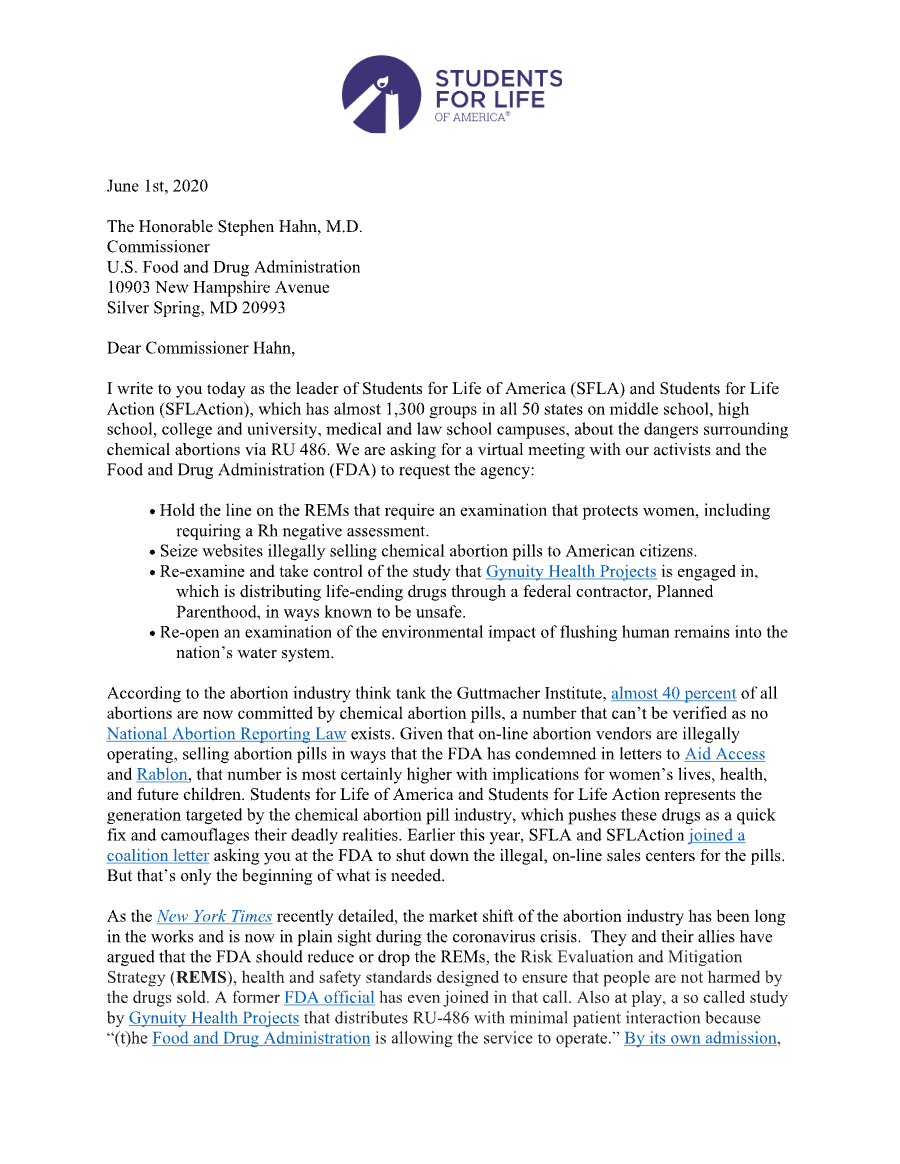
The Biden Administration has delivered an evil master class in federalizing support for abortion, specifically through the abuse of regulations and agency power. In the Department of Health and Human Services (HHS), the Department of Justice (DOJ), and the Department of Education (DOE), much of the policy has been implemented, although abortion support is found throughout the budget and programming, like cancer, siphoning off life-giving resources to an industry that profits from intentional deaths.

It’s tempting to say “we told you so” about the radical abuse of HHS policy in the Biden Administration. Students for Life Action (SFLAction) strongly opposed the nomination of California’s attorney, Xavier Becerra, to be head of HHS, given his radical abortion activism and lack of healthcare experience. And our concerns were justified.
On the largest scale, HHS and the Biden Administration have been working hand in hand with the abortion lobby to support businesses pushing intentional abortion death for profit. The HHS is no friend to women and their preborn children, weaponizing numerous programs to push and fund intentional abortion. Even so, there are still ways to make pro-life voices heard. Each time a terrible anti-life, anti-woman, and anti-baby rule is proposed, there is a window in which groups, organizations, and individuals can submit comments to the HHS. This can work to deter, delay, or even kill bad proposed rules despite the efforts taking place in a hostile administration. And while SFLAction has worked alongside other pro-life organizations to stop such agency abuses, too many new regulations are in place because of HHS efforts. This is a place to start work.
Rolling back the weaponization of HHS, DOJ, and DOE is a Day One agenda for any new administration, especially if the GOP wishes to encourage a state-focus on LIFE. Our federal policy is overrun with abortion supporting programs that need to be restored to a respect for LIFE in law and service. Nowhere is that clearer than at HHS.

The following represent HHS administrative efforts to coerce more pro-abortion policy through regulation or lack of acknowledgement of law and policy. The deadly anti-life proposals and policies include, but are not limited to, the following:
Biden Abortion Hotline Funded Through Title X
April 12, 2023: The Biden Administration announced that it will establish a national “hotline” to counsel individuals on how to obtain abortions and certain family planning services. The project had an estimated start date of September 30, 2023. According to the Administration, a $1.5 million hotline will be funded through the Office of Population Affairs and will operate as a supplement to the existing Title X Family Planning Services grant. The grant information states that one of the hotline’s purposes will be to offer information, counseling, and referral for “pregnancy termination.” The grant information states, “OPA expects the recipient to establish and operate a national hotline, develop and maintain a detailed national list of nondirective options referral service sites, and build and maintain a national website to compliment the hotline.”
HHS Reproductive Healthcare Access Task Force
January 21, 2022: HHS announced the formation of a new Reproductive Healthcare Access Task Force. As explained in this HHS fact sheet, the taskforce consists of “senior-level HHS officials” working to “coordinate activities across the Department.” The task force appears to have been developed to use the capabilities of HHS to promote abortion.
HHS Secretary Becerra Refuses to Acknowledge Law on Partial-Birth Abortion
May 21, 2021: During an Energy & Commerce Committee hearing, Secretary Becerra told Rep. Gus Bilirakis (R-FL) that “…there is no law that deals specifically with the term partial birth abortion.” When Rep. John Joyce (R-PA) and Rep. Dan Crenshaw (R-TX) asked the Secretary to acknowledge the existence of 18 U.S. Code § 1531, the Secretary responded by dodging the question.
Modifications of the REMS for the chemical abortion drug mifepristone
January 3, 2023: The Food and Drug Administration (FDA) announced that it was modifying the Risk Evaluation and Mitigation Strategy (REMS) to allow certified pharmacies (both physical locations and online retailers) to dispense the chemical abortion drug mifepristone. The announcement formalizes FDA’s decision in 2021 to remove the in-person dispensing requirement for mifepristone. Supporting Documentation: Updated REMS, FDA Q&A on Mifepristone, and FDA policy paper describing the change.

In addition to killing her preborn baby, consuming mifepristone creates significant health risks for the pregnant woman. For this reason, the FDA has established REMS for the medication. These are limitations designed to “help reduce the occurrence or severity of a particular serious adverse event.” Previously, these REMS included the requirement that mifepristone only be received in a doctor’s office and taken under the supervision of a health care provider certified to dispense it.
Final Rule Rescinding the 2019 Conscience Rule
January 11, 2024: The Biden Administration published a final rule entitled “Safeguarding the Rights of Conscience as Protected by Federal Statutes,” which will take effect on March 11, 2024.
The Office for Civil Rights (OCR) within the HSS has the responsibility to enforce federal laws protecting health care providers’ right of conscience and religious freedom. These conscience protections include the Church Amendments, the Coats-Snowe Amendment, and the Weldon Amendment. The Final Conscience Rule clarifies how these conscience laws will be enforced.
The Biden Administration’s final rule returns to the system, established under the Obama Administration’s 2011 Conscience Rule, of enforcing complaints on a “case-by-case basis.”
However, it did not rescind all language from the 2019 Conscience Rule. For example, it retains federal statutes included in the 2019 Rule not in the 2011 Rule. It also continues to include the requirement that OCR shall make “prompt investigation” of conscience complaints.
Proposed Rule Changing Requirements for TANF Program
October 2, 2023: HHS issued a proposed rule to amend the Temporary Assistance for Needy Families (TANF) program regulations, which included a rule change that targeted Pregnancy Care Centers.

At least four states, Indiana, Louisiana, Missouri, and Ohio, chosen to provide a portion of TANF funding to Pregnancy Care Centers (PRC). The proposed rule singles out states that have funded PRCs, suggesting that states must meet a steeper burden of proof that centers meet TANF’s statutory purposes and HHS will likely not approve funding them through TANF. At the same time, Planned Parenthood receives over $1 million from TANF annually.
Proposed Rule Facilitating Abortion Transportation for Minors in ORR Custody
October 4, 2023: HHS issued a proposed rule codifying the practice within the HHS Office of Refugee Resettlement (ORR) of facilitating abortions for minors in ORR custody, including transporting them across state lines.
Proposed Rule to Modify the Privacy Rule Under HIPAA
April 17, 2023: the Biden Administration published a proposed rule to modify the privacy rule under the Health Insurance Portability and Accountability Act of 1996 (HIPAA) and the Health Information Technology for Economic and Clinical Health Act of 2009 (HITECH Act). (Additional resources: Press Release and Fact Sheet and OCR Guidance.)
The Proposed Rule creates special protections for abortion that limit cooperation with law enforcement, undermine the ability to report abuse, restrict the provision of public health information, and erase the humanity of preborn children.
Proposed Rule: “Coverage of Certain Preventive Services Under the Affordable Care Act”
February 2, 2023: The Biden Administration published a proposed rule, entitled “Coverage of Certain Preventive Services Under the Affordable Care Act,” which would modify ACA regulations on the HHS contraceptive mandate. The proposed rule was open for public comments for 60 days (until April 3, 2023).

The Affordable Care Act, passed March 2010, required all private health care plans to cover “preventative care for women” and subsequent HHS regulations required health care plans to cover all FDA-approved contraceptives (including sterilization and abortifacient drugs) without direct cost to the patient. Although the HHS Mandate contained an exemption for churches and their affiliates, it did not exempt religious nonprofits and businesses run by people of faith who objected based on religious conviction.
Final Rule: Title X Funding
October 4, 2021: HHS issued a final rule reversing the Trump Administration’s 2019 Title X Rule (the “Protect Life Rule”) and allows Title X family planning funding to flow to organizations that provide elective abortion. The rule was effective on November 18, 2021.
The underlying Title X statute (42 U.S.C. 300a-6) prohibits Title X dollars from funding abortion as a method of family planning. However, the Biden Administration’s final rule actively supports abortion by providing funding to clinics that perform elective abortions and by requiring grantees to make abortion referrals.
House Member Comment Letter on ACA Separate Payment Proposed Rule
September 27, 2021: HSS published a final rule entitled, “Patient Protection and Affordable Care Act: Updating Payment Parameters, Section 1332 Waiver Implementing Regulations, and Improving Health Insurance Markets for 2022 and Beyond.” It reverses the Trump Administration’s 2019 Integrity Rule. It allows Affordable Care Act (ACA) plans to embed an abortion surcharge within a plan’s monthly premium, making it difficult for policy holders to identify whether the plan they are purchasing includes coverage for elective abortion.
HHS Change in Fetal Tissue Policy
April 16, 2021: The National Institutes of Health (NIH) announced that the HHS would be reversing Trump Administration policy prohibiting federal funding of research using fetal tissue obtained from elective abortion.
Trump Administration Policy:
On June 5, 2019, HHS announced several changes to its policy on the use of fetal tissue in projects done by researchers within HHS (intramural research) and by outside researchers receiving NIH funding (extramural research):
- Intramural Research: HHS would no longer conduct intramural research that requires new fetal tissue from elective abortions. This change applied to both new research and ongoing projects.
- Extramural Research: HHS announced that, pursuant to federal law (42 U.S.C. § 289a-1), new applications for extramural research using human fetal tissue would be subject to congressionally authorized review by an ethics advisory board. On August 18, 2020, the Human Fetal Tissue Research Ethics Advisory board issued a report to the Secretary of HHS and Congress. It recommended withholding funding for 13 out of the 14 research proposals submitted that would use fetal tissue (the body parts of aborted babies).
On January 13, 2021, HHS issued a proposed rule to adopt or strengthen safeguards for extramural human fetal tissue research. It sought to strengthen informed consent requirements and ensure compliance with the prohibition in federal law against providing “valuable consideration” for human fetal tissue.
Biden Administration Policy:
The Biden Administration stated that HHS will no longer require extramural research applications for NIH grants and contracts proposing the use of human fetal tissue from elective abortions to be reviewed by an Ethics Advisory Board.
We know the Biden Administration and Democrat members of Congress have made advocating for life extremely difficult. Restoring a culture of life must include returning programs to their life-affirming intentions.
You can learn about other federal departments and programs polluted with abortion emphasis at the Pro-Life Generation News website.
Share this post
Recent Posts

Abortion Brags from Lily Allen & Hat from Cynthia Nixon Enrage Even Pro-Choice Americans. Can the Pro-Life Generation Take Some Credit?
11 Jul 2025
Young Mom Prayed for God’s Hand on Her Child – At Her Ultrasound Appointment, THIS Happened
11 Jul 2025
Letter to the FDA Regarding Chemical Abortion Drugs June 2020
10 Jul 2025

